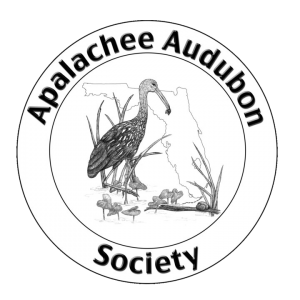In the spring of 2024, Apalachee Audubon awarded two grants of $500 each to the FSU Spoonbill Society and the Babies Breath Circle of the Tallahassee Garden Club. Read their reports below about how they utilized the funds.
Saving Birds from Window Strikes | Lights Out Campaign
Since 2023, members of FSU’s birding club, the Spoonbill Society, have been documenting fatal-bird window strikes on the FSU campus. What started as a class project to determine how building characteristics and migration intensity affected the frequency of window-strikes has developed into a multi-year surveying effort and advocacy for the implementation of effective solutions.
Two students, Kaya Simmons and Nika Povelikin, collecting data on a windowstrike victim. Photo by Devin Bittner
Window collisions pose a major threat to bird populations, killing up to 1 billion birds per year in the US alone. Across North America, bird populations are in overall decline, with many migratory species being exceptionally threatened. Leon county is in the pathway of two major migratory flyways, meaning millions of birds can pass over the area in just one night during migration. Combing the knowledge of avian decline, the threat of windows, and the significance of Leon County for migratory species, students at FSU decided it was necessary to start documenting window-strikes on their campus and doing what they can to help.
Picture of a Tennessee Warbler found stunned from hitting a window on the FSU campus.
With this project, the Spoonbills hope to create a long-standing dataset of bird-strikes on campus, determine what factors increase the likelihood of window-strikes, spread awareness about this threat and educate about effective solutions, and develop a campus-wide “lights out” initiative to decrease the fatalities of migratory birds on our campus.
In 2024, the Apalachee Audubon Society awarded members of the club $500 to support both necessary supplies and outreach for the project. To collect data, students spend about two weeks once every season surveying seven buildings on campus to find birds who have struck windows. The grant helps fund supplies such as gloves and plastic bags so that located birds found can be salvaged and collected to become museum specimens or for other scientific use. Funds will additionally be used to support the launching of a “Lights Out” campaign in Fall 2025 to promote campus-wide education about migration, window-strikes, and the importance of protecting birds. Students have been working closely and diligently with FSU Facilities to design a campaign including posters, stickers, a website page, and a week’s worth of bird-themed events to kick off Fall migration and a Lights Out initiative. Students are also working to get window stickers on one of the campus’s most bird-threatening buildings.
Example of “Lights Out, FSU!” campaign sticker design.
Outside of the direct benefits to birds, the Spoonbills hope this completely student-driven initiative will inspire others to take action to protect their local biodiversity. The funds from this grant will support this project for years to come, and will allow us to continue working to protect birds and building a community of students wanting to make a difference.
Bruce J. Host Northeast Branch Library Project: Native Plant and Wildflower Demonstration Garden
Tallahassee Garden Club, Babies Breath Circle, has been striving to assist in local habitat improvement and environmental education via its native plant and wildflower demonstration garden at the Bruce J. Host Library, 5513 Thomasville Road, Tallahassee, since April, 2023. By February 2004, the new garden and plant identifier signs had been well received by the public. As a result, the circle began to look forward to improving and expanding its project. By chance, circle members became aware of the Bruce Fusaco Conservation Grant and applied for assistance with its garden.
The application itself helped identify current needs for the expansion and narrowed the 2024 focus to additional native plantings and freshwater basins to encourage native birds, butterflies and other pollinators to use the area. The grant award gave the circle funds needed for these improvements, plus advice and counsel from Donna Legare.
Donna’s knowledge and work with the circle helped with the selection and location of the new plants. Numerous consultations with her reduced the number of trial and error experiences usually suffered by novices attempting to create wildlife habitats. Her suggestions on birdbaths, stepping stones and hardscape maintenance greatly contributed to a successful year. Donna’s skill in anticipating how plants will grow, spread, reseed, and fill the area will continue to be appreciated in the years to come.
The garden improvements have caused an increase in native bees at the site. No matter what time of day circle members attend to watering chores, bees are seen on flowering plants and bushes. The number of butterflies of various species in the garden has increased fivefold. The sight of them makes watering less of a chore.Two freshwater basins, surrounded by cardinal flowers, encourage hummingbirds and song birds to the sight. There is movement, sound, and visual delight throughout the year. The landscape frequently changes and expands. Placards with common and Latin plant names, QR codes, together with our website page on the Florida Wildflower Foundation site, encourage library patrons to add the plants they enjoy to their own yards. Many visitors have confessed to using some of the native plant choices in their own backyards, thanks to our demonstration garden.
In summary, the exciting expansion of the circle’s original work could not have happened without the Ben Fusaco Grant and we are forever grateful for the award. We have received an exceptional, hands-on education about native plants, regional ecology, and conservation. As undeveloped land close to the library is developed, the demonstration garden will gain greater importance in local education about the unique ecology and biodiversity of North Florida and the need for native plantings in our home landscapes.
Winter Preparation November 2024
Water Feature, Bird, Bee and Butterfly Attractors
Entrance Symmetry, Mildly Restrained Natives for Government Buildings






